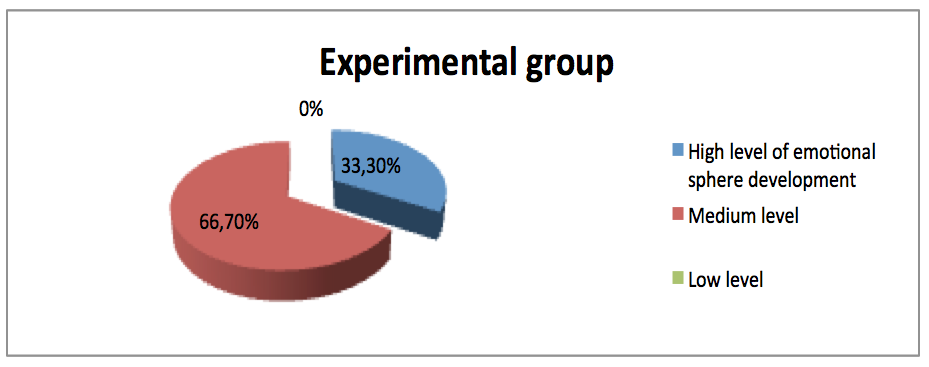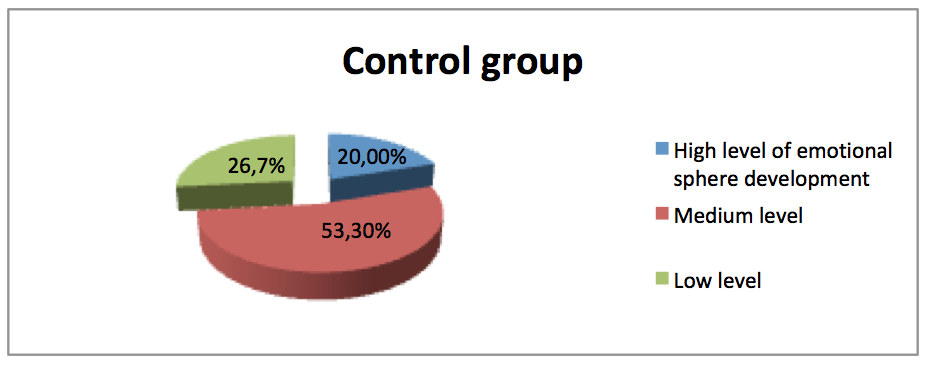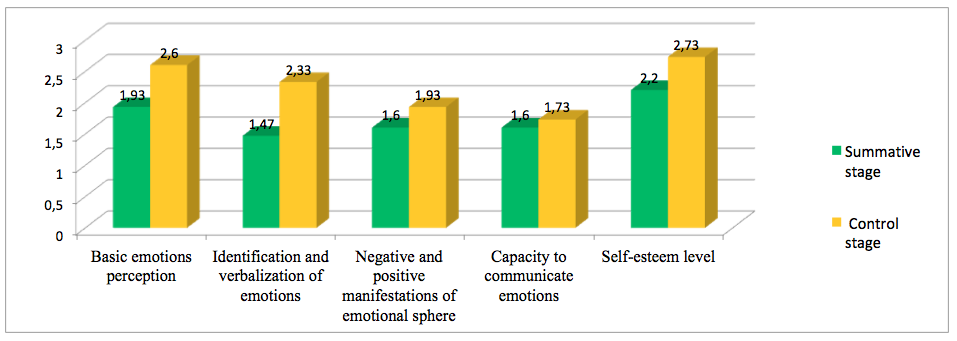Abstract
The main methods used by many educators and psychologists for the correction of emotional sphere of preschool children are the forms of art and creative activities accessible to preschoolers, in other words, art therapy. The present study includes three main stages. The diagnostic stage of our experimental study aims at diagnosing the emotional sphere of six-year-old preschoolers with mental development delay. The development stage includes the employment of the program “Our Emotions”. The control stage consists in the secondary diagnostics of the emotional sphere development of preschoolers under study. The study shows that art therapy can be successfully used in relation to emotional sphere as well as self-esteem level in preschool children with mental development delay. Therefore, correction programs including art therapy elements for senior preschoolers have a unique potential for their correctional-developmental education. This method gives the child opportunities for self-revelation and self-realization, and also creates necessary conditions for a specialist for diagnosing and correcting the child’s emotional state. The experiment conducted shows that senior preschoolers with mental development delay have significant difficulties in realizing and expressing their emotions as well as insufficient skills at controlling their own emotional states. Using art therapy elements and methods in the correctional work will contribute to the successful overcoming of deficiencies in emotional sphere in senior preschoolers with mental development delay.
Keywords: Art therapyemotional spherepsychology of preschool children with mental development delay
Introduction
The study of emotional sphere in the presence of different types of mental development delay, when emotional deficiencies are some of the most important impairments, has recently become increasingly relevant (Rotar, 2016; Semenaka, 2014; Kislyakov, 2017; Almazova et al., 2017). The inadequacy of emotional reactions of preschoolers with mental development delay to actual events is often the major obstacle to their successful interpersonal interaction with children of the same age and adults. And, it determines social isolation of preschoolers with mental development delay (Kolosova, 2016; Vygotsky, 2006; Zaporozhec, 2007).
The main methods used by many educators and psychologists (Kopytin, 2014; Kiseleva, 2014; Krasnyj, 2015; Kolyagina, 2016; Kislyakov et al., 2017) for the emotional sphere correction in preschool children are forms of art and creative activity accessible to preschoolers, in other words, art therapy.
Art in corrective work for developing preschoolers’ emotional sphere is used not as a full reflection of reality, but as a means of self-expression, reducing emotional tension and developing the recognition skills of emotions. Therefore, the problems of the emotional sphere development in senior preschoolers with mental development delay using art therapy elements are relevant and have a significant practical interest.
Problem Statement
Senior preschoolers with mental development delay have significant difficulties in realizing and expressing their emotions as well as insufficient skills at controlling their own emotional states. Efficiency of the usage of art therapy elements and methods in corrective work aimed at overcoming deficiencies in the emotional sphere development in senior preschoolers with mental development delay have not yet been studied adequately.
Research Questions
-
What are the methods of efficient diagnostics of the emotional sphere state in senior preschoolers with mental development delay?
-
What constitutes an efficient program of corrective lessons including art therapy elements and methods for developing emotional sphere in six-year-old preschool children with mental development delay?
-
How efficient is the art therapy method for developing emotional sphere in preschool children with mental development delay?
Purpose of the Study
The purpose of the experiment is to study the influence of art therapy on the emotional sphere development in senior preschoolers with mental development delay.
Research Methods
The following research methods were used in the study:
Observation of senior preschoolers with mental development delay in the process of productive and creative activities, everyday routines and playing activities.
The questionnairemethod for educators, specialists and parents of the seniour preschoolers with mental development delay.
Psycho-diagnostic methods:
The methodology “Emotional Faces”, developed by N.Y. Semago.
The methodology “Emotional Identification”, developed by E.I. Izotova.
The methodology “Drawing an Imaginary Animal”, developed by M.Z. Drukarevich.
The methodology “Evaluate and Show Other People’s Emotions”, developed by G.A. Uruntayeva, Y.A. Afonkina
The methodology “Ladder” by Shchur V.G.
Correlation analysis using the t-test.
The study was conducted from December, 2016 till March, 2017 at the State Budgetary Social Service Institution “Chekhov Social and Rehabilitation Centre for Children “Aistenok”. In this centre, special education teachers worked on correcting mental development problems in preschool and school children with disabilities, including mental development delay.
The study included three main stages: diagnostic, development and control. The diagnostic stage of our experimental study aimed at primary diagnostics of the emotional sphere development of six-year-old preschoolers with mental development delay. The development stage included developing and using the program “Our Emotions”. The control stage consisted in secondary diagnostics of the emotional sphere development of the preschoolers participating in the experiment.
30 six-year-old preschool children with mental development delay took part in the experimental study. 15 subjects (8 girls and 7 boys) constituted the experimental group, and the other 15 children (7 girls and 8 boys) constituted the control group of participants.
Findings
Diagnostics of the experimental group of six-year-old preschool children with mental development delay during the summative stage of the experiment showed the following results: the experimental group of pre-school children with mental development delay was characterized by a low level of emotional development.

A high level of emotional sphere development was found only in one six-year old child.
A medium level of emotional sphere development was found in eight children from the experimental group.
Emotional sphere of this subgroup of the experimental group of the preschool children with mental development delay could be characterized as follows.
On the whole the children perceived all the basic human emotions (joy, anger, fear) correctly. But when assessing the emotional states of people on the photographs they often mixed up boundary emotional states (e.g. joy and surprise, shame and sadness, anger and disgust).
When trying to describe emotional states verbally they did it in a very superficial manner, often limited to words like “is happy”, “is crying”, or “is angry”.
The most difficult emotional state to perceive for this category of senior preschoolers was surprise, as well as disgust and anger.
Besides that, results of the diagnostics of the six-year-old preschoolers of the experimental group showed a low level of emotional sphere development – 6 preschoolers.
In this category of the senior preschoolers the emotional sphere was significantly behind that of the other children of the same age, including children with mental development delay.
The diagnostics of the emotional sphere of the control group preschoolers resulted in the conclusion that their emotional sphere development level was somewhat higher than that of the experimental group preschoolers.

Using the special program with art therapy elements of the emotional sphere correction with the experimental group of the senior preschoolers with mental development delay showed that such correctional lessons have not only a direct therapeutic impact on perception and emotional communication of the children with mental development delay, on their attitude to themselves and other people, to situations making them anxious in their everyday lives, but also on their own positive attitude to the world.

Our study showed that art therapy can be successfully used for the emotional sphere as well as self-esteem level correction in pre-school children with mental development delay.
Conclusion
Our study shows that art therapy can be successfully used in relation to emotional sphere and self-esteem level correction in preschool children with mental development delay.
Therefore, programs on correction including art therapy elements in lessons for senior preschoolers have a unique potential for corrective-developmental education. Such method gives the child opportunities for self-revelation and self-realization, and also creates necessary conditions for the specialist for diagnosing and correcting the child’s emotional state.
Therefore, the problem under study has been solved. The experiment conducted shows that senior preschoolers with mental development delay have significant difficulties in realizing and expressing their emotions as well as insufficient skills at controlling their own emotional states. Using art therapy elements and methods in the correctional work will contribute to the successful overcoming of deficiencies in the emotional sphere development in senior preschoolers with mental development delay.
Acknowledgments
We would like to thank the State Budgetary Social Service Institution “Chekhov Social and Rehabilitation Centre for Children “Aistenok” for the possibility to conduct this study.
References
- Almazova, O. V., Veraksa, A. N., Bukhalenkova, D. A., Dontsov, A. I., Zotova, O. Yu., Perelygina, E. B. (2017). Development features of preschool children with different anxiety levels. The European Proceedings of Social & Behavioural Sciences EPSBS. "The European Proceedings of Social & Behavioural Sciences EPSBS", 8-17. DOI: 10.15405/epsbs.2017.12.2.
- Kiseleva, M.V. (2014) Art-terapiya v rabote s det'mi [Art therapy in work with children]. Moscow: Rech'. [in Russian].
- Kislyakov, P. A. (2017). Risk factors related to antisocial behaviour in teenagers with intellectual disabilities. Psychology in Russia: State of the Art, 10(2), 215-227. DOI: 10.11621/pir.2017.0215
- Kislyakov, P., Silaeva, O., Fefanov, V. (2017). Psychological indices of social safety of children with disabilities. RRI 2016 - International conference responsible research and innovation. The European Proceedings of Social & Behavioural Sciences, 26, 407-413. DOI: 10.15405/epsbs.2017.07.02.52
- Kolosova, N.V. (2016). Razvitie poznavatel'nyh sposobnostej u starshih doshkol'nikov s zaderzhkoj psihicheskogo razvitiya [Cognitive abilities development in senior preschoolers with mental development delay], Seriya - «Korrekcionnaya pedagogika» [‘Correctional Pedagogy’ series]. Moscow: Arkti, 2016. [in Russian].
- Kolyagina, V.G. (2016). Art-terapiya i art-pedagogika dlya doshkol'nikov, Uchebno-metodicheskoe posobie [Art therapy and art pedagogy for pre-school children. Methodology study guide]. Moscow: Uniti-Dana. [in Russian].
- Kopytin, A.I. (2014). Diagnostika v art-terapii, Metod Mandala, Uchebnoe posobie [Diagnostics in art therapy. The Mandal method. Study guide]. Moscow: Psihoterapija [Psychotherapy]. [in Russian].
- Krasnyj, Yu. E. (2015). Art-vsegda terapiya, Razvitie detej so special'nymi potrebnostyami sredstvami iskusstva [Art-forever therapy. Development of children with special needs by means of art.]. Moscow: Doroga v mir. [in Russian].
- Rotar, N.V. (2016). Zanyatiya dlya detej s zaderzhkoj psihicheskogo razvitiya, Starshij doshkol'nyj vozrast [Lessons for children with mental development delay. Senior preschool age]. Moscow: Uchitel. [in Russian].
- Semenaka, S.I. (2014). Social'no-psihologicheskaya adaptaciya rebyonka v obshchestve, Korrekcionno-razvivayushchie zanyatiya [Social-psychological adaptation of the child in the society. Correctional and developing activities]. Moscow: Arkti. [in Russian].
- Vygotsky, L.S. (2006). Problemy razvitiya psihiki. Sobranie sochinenij [Issues of psychic development. Complete works], 3 tom [Vol. 3]. Pedagogika. [in Russian].
- Zaporozhec, A.V. (2007). Psihologiya detej doshkol'nogo vozrasta [Psychology of preschool children]. Moscow: Akdi. [in Russian].
Copyright information

This work is licensed under a Creative Commons Attribution-NonCommercial-NoDerivatives 4.0 International License.
About this article
Publication Date
13 July 2018
Article Doi
eBook ISBN
978-1-80296-042-6
Publisher
Future Academy
Volume
43
Print ISBN (optional)
-
Edition Number
1st Edition
Pages
1-694
Subjects
Child psychology, developmental psychology, child care, child upbringing, family psychology
Cite this article as:
Petrova, E., Feofanov, V., Kislyakov, P., Dmitrieva, V., Vereitinova, T., & Sklemina, D. (2018). Art Therapy`S Influence On Preschoolers`S With Mental Delay Emotional Development. In S. Sheridan, & N. Veraksa (Eds.), Early Childhood Care and Education, vol 43. European Proceedings of Social and Behavioural Sciences (pp. 358-363). Future Academy. https://doi.org/10.15405/epsbs.2018.07.47

